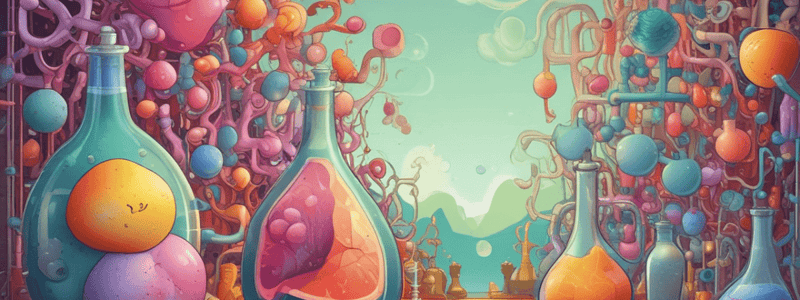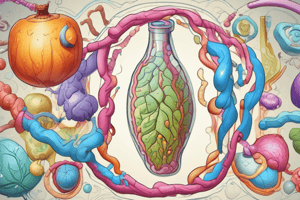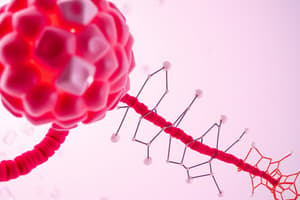Podcast
Questions and Answers
Which condition will result in a high rate of de novo synthesis of fatty acids?
Which condition will result in a high rate of de novo synthesis of fatty acids?
- A low-carbohydrate diet in a restricted caloric intake
- A high-carbohydrate diet in a well-fed state (correct)
- A high-fat diet in a starved state
- A low-protein diet in a starved state
What effect does insulin have on the rate of de novo synthesis of fatty acids?
What effect does insulin have on the rate of de novo synthesis of fatty acids?
- Activates pyruvate dehydrogenase complex (correct)
- Inhibits de novo synthesis
- Increases lipolysis in adipose tissue
- Decreases the transport of glucose into the cell
Which molecules inhibit the activity of acetyl-CoA carboxylase?
Which molecules inhibit the activity of acetyl-CoA carboxylase?
- Glucagon and epinephrine (correct)
- Malate and pyruvate
- Insulin
- Citrate and fatty acids
Through which pathway(s) is NADPH produced for de novo fatty acid synthesis?
Through which pathway(s) is NADPH produced for de novo fatty acid synthesis?
What impact do fatty acids have on citrate regarding de novo synthesis of fatty acids?
What impact do fatty acids have on citrate regarding de novo synthesis of fatty acids?
Which statement correctly describes the role of citrate in de novo synthesis of fatty acids?
Which statement correctly describes the role of citrate in de novo synthesis of fatty acids?
Flashcards are hidden until you start studying
Study Notes
Regulation of De Novo Synthesis of Fatty Acids
Nutritional State
- De novo synthesis rate is high in well-fed individuals with a high-carbohydrate diet, converting surplus glucose to fat.
- Restricted caloric intake depresses de novo synthesis rate.
Enzymes Involved in De Novo Synthesis
- Acetyl-CoA carboxylase is the rate-limiting enzyme in de novo synthesis.
- Increase in acetyl-CoA carboxylase activity is caused by:
- Citrate
- Insulin, which also stimulates de novo synthesis by:
- Increasing glucose transport into the cell for fatty acid synthesis
- Activating pyruvate dehydrogenase complex to convert pyruvate into acetyl-CoA
- Inhibiting lipolysis in adipose tissue
- Inactivation of acetyl-CoA carboxylase is caused by:
- Hormones such as glucagon and epinephrine
- Fatty acids, which exhibit negative feedback inhibition and also:
- Inhibit citrate exit from the mitochondria into the cytosol
- Inhibit pyruvate dehydrogenase complex, reducing available acetyl-CoA for de novo synthesis
Sources of NADPH
- NADPH for fatty acid synthesis comes from:
- Pentose phosphate pathway in the cytoplasm
- Malate pyruvate cycle, where NADPH is formed in the cytoplasm during malate to pyruvate conversion
Studying That Suits You
Use AI to generate personalized quizzes and flashcards to suit your learning preferences.




